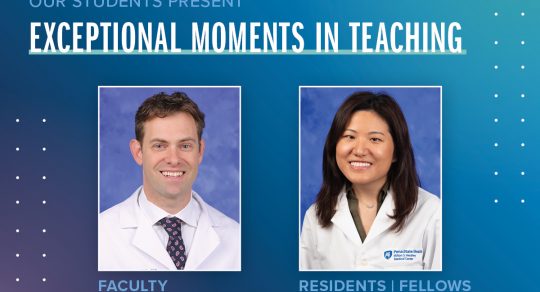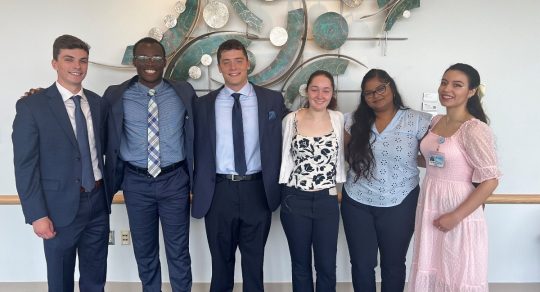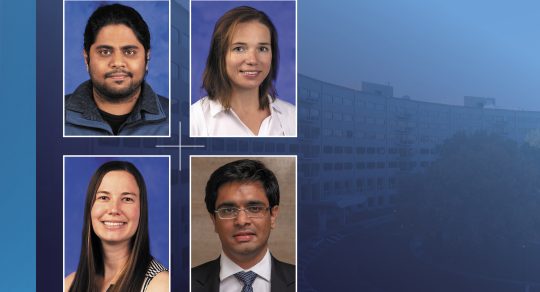Programs
Ophthalmology Residency
The Ophthalmology Residency at Penn State Health Milton S. Hershey Medical Center is a four-year, ACGME-accredited integrated program that admits three residents per year.
Explore More
Residents entering the program must have successfully completed a post-graduate clinical year (PGY-1) in a program accredited by the ACGME or the Royal College of Physicians and Surgeons of Canada.

Program Overview
Many factors combine to distinguish the Ophthalmology Residency at Penn State Health Milton S. Hershey Medical Center as a leader in ophthalmology resident education:
The program is associated with Penn State College of Medicine and Penn State Health, the leading academic health system in central Pennsylvania.
The faculty of full-time ophthalmologists have expertise in all of the subspecialty areas in ophthalmology.
The program size allows for ample opportunities to interact on a one-to-one basis with faculty.
The patient population is interested in joining with faculty and residents to optimize their health care.
The program is committed to provide the best in clinical and surgical education through direct patient care and a variety of innovative and effective educational programs.

“At the Penn State Eye Center, residency education is cornerstone to our departmental mission. We strive to create a collaborative team approach to the medical and surgical treatment of complex ophthalmic disease, providing the guidance and resources for our residents to develop the skills and tools they need to grow into future leaders in field of ophthalmology.”
Christopher Weller, MD
Program Director
Program Highlights
More than 22 full-time faculty with expertise in the major ophthalmic subspecialties (cornea; general eye care; glaucoma; neuro-ophthalmology; medical retina; oculoplastic surgery; ophthalmic pathology; pediatric ophthalmology; vitreoretinal surgery)
Resident-focused program admitting three residents per year
The ratio of faculty to residents is greater than 2:1
Full ACGME accreditation
Two clinical sites (Penn State Health Milton S. Hershey Medical Center for two-thirds of the program and Lebanon VA Medical Center for the remaining third)
State-of-the-art facilities and equipment
Optimum balance of medical and surgical training and resident autonomy and supervision
Highly collaborative environment among faculty, residents and staff
Supportive learning environment with ample opportunities to interact with faculty, fellow residents and medical students
Innovative surgical training program with state-of-the-art Clinical Simulation Center
Access to dedicated resources on ophthalmology from Harrell Health Sciences Library
Dedicated resident research experience (all residents have had their research accepted for presentation at ARVO)
Exceptional fellowship match success at top fellowship programs

“My favorite part of being at the Penn State Eye Center is working with the residents so that the care patients receive is better than what I can provide by myself. Resident education is not just one of our core missions, it is the life of our department. Educating the next generation of eye care providers is the highlight of my day-to-day interactions.”
Seth Pantanelli MD
Professor of Ophthalmology, Cornea Specialist
Learn More about the Residency
Our Mission
to provide the highest quality eye care to our patients
to enhance this care through education and research
to create an environment where our people can develop professionally and find fulfillment in their work
Our Shared Values
respect
integrity
teamwork
excellence
Our Commitment
to recruit faculty and residents who are passionate about ophthalmology and ophthalmology education
to create a supportive and empowering learning environment where motivated individuals can thrive
to provide the essential elements (people, equipment, and experiences) to enable our people to achieve their personal and professional goals in Hershey and beyond
General Application Information
During enrollment, eligible applicants for the Ophthalmology Residency must apply through the Central Application Service of the San Francisco Match Program for Ophthalmology (SF Match), sponsored by the Association of University Professors of Ophthalmology. Applications are reviewed by members of the faculty and the residency program director. Interviews are then offered to outstanding candidates.
Prospective residents are evaluated based on their preparedness, ability, aptitude, academic credentials, communication skills and personal qualities such as motivation and integrity. While the USMLE score is a factor that is considered, the program does not have a set minimum score requirement. The application review committee looks at all aspects of an application to determine interview status.
The Ophthalmology Residency does not discriminate with regard to sex, race, age, religion, color, national origin, disability or veteran status.
Application Guidelines and Prerequisites
Applicants must also apply for a PGY-1 preliminary spot in Internal Medicine, General Surgery, Pediatrics, etc., through the National Residency Matching Program (NRMP) in addition to their application for a PGY-2 ophthalmology residency position through the San Francisco Match Program.
The program typically receives more than 100 times the applications as there are positions available (three).
MD and DO applications are both reviewed, as are those from international or foreign medical graduates, though the program only sponsors J-1 visas.
Because of Pennsylvania licensure requirements, applicants must complete University of Pittsburgh Child Abuse Reporter Training.
While the Ophthalmology Residency is not an integrated program, many residents complete their internship year at Penn State Health Milton S. Hershey Medical Center as well.
Application Timeline
Oct. 1 is the deadline for applications. Interviews are conducted in November and December.
Our residents are highly successful on the fellowship front. Penn State residents have secured positions at premier fellowship programs including: Wills Eye Institute; Duke Eye Center; Bascom Palmer Eye Institute; Kellogg Eye Center; University of Colorado; Vanderbilt; Scheie Eye Institute. If you bring passion and a strong work ethic, you can count on us to provide the experiences and support you need to achieve your professional goals.
How do the residents describe the program and their fellow residents?
When asked to list three words that capture the essence of the program, the residents used words like: supportive; collaborative; collegial. They described their fellow residents as: passionate; hardworking; team-oriented; generous; empathetic.
Residency training is a once-in-a-lifetime opportunity and should be one of the best learning experiences of your life. Regardless of where you match, you will learn to practice ophthalmology. But why not choose a place where the learning environment is supportive, collaborative, collegial and your fellow residents are passionate, hardworking and team-oriented?
Training overview
Ophthalmology training at Penn State strives to achieve the optimum balance of supervision and autonomy, medical and surgical experiences, classroom and hands-on training. Most days begin with a basic and clinical science conference series where faculty and residents explore all things ophthalmology. In addition to the daily conference schedule, several recurring monthly programs include: Grand Rounds/Visiting Professor series, Quality Improvement, and a department-wide TEAM Ophthalmology meeting for faculty, residents and staff. The program holds dedicated review sessions to ensure residents are well-prepared for the annual OKAP exam and, ultimately, the American Board of Ophthalmology written qualifying and oral board examinations. The surgical education program includes didactic, simulation and hands-on experiences. Surgical simulation models have been developed for many ocular surgeries including cataract surgery, strabismus surgery, intravitreal injections, oculoplastic and reconstructive surgery. Hands-on surgical training begins in year one and involves one-on-one interaction with outstanding surgeon-educators. The program's surgical volume exceeds the ACGME requirements in all categories and in some cases ranks among the top in the nation.
Cataract Surgery Training
EYESI Computer Simulator
Microsurgery Wet Lab
Supervised curriculum by leading cataract surgeons
24/7/365 access for independent training
Phacoemulsification and femtosecond laser-assisted cataract surgery training
Toric and multifocal lens experience
Ability to attend national cataract surgery training courses
A Day in the Life of a Resident
The day begins at 7 a.m. and typically wraps up by 5:30 or 6 p.m. The program does everything it can to limit evening and weekend responsibilities so everyone can invest and flourish in their personal lives in addition to ophthalmology. The reality is you can do both. Resident call is reasonable. The PGY-2 and PGY-3 residents share first call while the PGY-4 residents provide backup and surgical call. Residents are supervised by two faculty attendings: one for general call and another for surgical retina emergencies. Call takes place at Penn State Health Milton S. Hershey Medical Center. During the PGY-2 and PGY-3 years, call is every sixth night and sixth weekend (Fri-Sat-Sun). Call is from home. PGY-4 residents initially accompany the PGY-2 residents during the first month of call. Following this orientation period, PGY-4 residents provide backup and surgical call every third week. If you need to come in as a PGY-4 resident, it usually is for a complex patient or someone requiring emergent surgery. One of the strengths of our program is the effectiveness of the residents as teachers. The goal is to recruit residents who love to work in teams. At Penn State no one excels at the expense of someone else; instead, when one person thrives, everyone thrives.
At a glance
What a Penn State Ophthalmology Resident's day might look like:
7 a.m. - morning lecture
7:50 a.m. - Starbucks run
8:30 a.m. - VA OR
Noon - Lunch at Queso Dee'as or A&M Pizza with the attending and co-residents
1 p.m. - Clinic (Procedures: YAG, SLT, PRP, injections, biopsies, etc.)
5 p.m. - Lens calcs with seniors
6 p.m. - Family time!
10 p.m. - Last minute retina prep (quiz on Chapter 6 in the morning)
The program's shared values include teamwork, innovation, service and excellence. The residency extends its reach beyond the walls of the Penn State Eye Center and Lebanon VA Medical Center into local communities and abroad. One of the most important community outreach activities involves working with Penn State medical students as part of Lion Care, a student-lead medical clinic for individuals at the Bethesda Mission in Harrisburg, Pennsylvania. Penn State ophthalmology provides complete eye evaluations on an annual basis and are in the process of expanding our relationship to include an in-house eye clinic.
Through the generosity of Dr. Albert and Virginia Alley, the department has established the Alley Endowment for Global Ophthalmology Outreach. This endowment provides financial support to underwrite the costs associated with travel to ophthalmology service missions abroad. In past years, Penn State ophthalmology residents have accompanied dedicated eye care teams to Ecuador, Dominican Republic, Honduras, Tanzania, Ghana and Ethiopia. Residents describe these trips abroad as “life changing” and “remarkably humbling” experiences.
Leadership

Program Coordinator, Ophthalmology Residency and Corneal and External Disease Fellowship, Ophthalmology
Supporting Your Training

"We appreciate your interest in our residency program. Our diverse faculty, residents, and staff work together to create a truly exceptional ophthalmology residency training experience right here in Hershey, Pennsylvania - the sweetest place on earth!"
David Quillen, MD
Chair of the Department of Ophthalmology
Curriculum Details
The first two years of residency training are split between general and subspecialty ophthalmology. Subspecialty rotations include cornea and external diseases, glaucoma, pediatric and neuro-ophthalmology, oculoplastics and retina. Experience in general ophthalmology as well as optometry practice is gained through rotations on emergency room/hospital consultation services at Hershey and through general ophthalmology outpatient clinic practice at the VA Medical Center in Lebanon. Goals and objectives have been set for each subspecialty rotation and post-rotation evaluations are conducted with each resident to ensure that the residents are achieving the stated goals.
During the subspecialty rotations, the residents accompany the faculty to the operating room one to two days per week. This provides valuable surgical experience in the first two years of training and facilitates participation in the pre- and post-operative care of their patients.
The final year of training consists of four months at Hershey and eight months at the VA Medical Center. Two senior residents are always scheduled at the Lebanon VA Medical Center, and one senior resident is always scheduled at the Hershey site. The majority of Class I cataract surgeries are performed at the Lebanon VA Medical Center under the direct supervision of faculty members. In addition to the outstanding clinical and surgical experience available at the VA Medical Center, senior residents have the opportunity to develop administrative and teaching skills. The senior resident rotations in Hershey are focused on development of surgical skills through experiences in the hospital OR and Hershey Outpatient Surgery Center. The senior residents also care for pre- and post-operative patients in the clinics of faculty ophthalmic surgeons and see their own patients in the comprehensive ophthalmology clinic, which is held weekly.
Integrated PGY-1 Year
“Integrated” defined:
combining or coordinating separate elements so as to provide a harmonious, interrelated whole;
organized or structured so that constituent units function cooperatively
The program has partnered with its primary teaching affiliate to create what it believes is the best possible training experience for residents – a fully integrated PGY-1 year. The PGY-1 residents spend six months at Penn State Health Milton S. Hershey Medical Center and six months at Lebanon VA Medical Center.
Hershey Medical Center: PGY-1 residents complete three months of ophthalmology working side-by-side with their faculty and resident colleagues at the Penn State Eye Center. In addition to ophthalmology training, PGY-1 residents rotate with select subspecialties for the remaining time in Hershey.
Lebanon VA Medical Center: PGY-1 residents spend six months at the Lebanon VA Medical Center. The rotations focus primarily on ambulatory care experiences in a variety of medical and surgical subspecialties.
At a glance
Coordinated and administered by ophthalmology
Located at Penn State Health Milton S. Hershey Medical Center and Lebanon VA Medical Center
3 months of ophthalmology and 9 months of general medicine
Ambulatory care focus
First- and second-year ophthalmology residents take call, on average, every sixth night and every sixth weekend. Weekend call extends from Friday at 5 p.m. through Monday morning at 8 a.m.
Third-year residents take secondary/surgical call every third week.
A faculty member is assigned on-call responsibilities on a weekly basis and provides appropriate supervision for all residents.
To ensure that residents are achieving success in the areas of medical knowledge, patient care, interpersonal and communication skills, professionalism, practice-based learning and improvement and systems-based practice, the Ophthalmology Residency utilizes a variety of methods.
Resident performance is assessed primarily through direct observation and evaluation by members of the faculty. Other methods include evaluations by medical students and patients, performance in the Case-Based Learning in Ophthalmology (CBLO) series, the Ophthalmology Skills Assessment Program (OSAP), Ophthalmology Clinical Evaluation Exercises (OCEX), Simulated Oral Boards in Ophthalmology (SOBO) and performance on written examinations, including the Ophthalmology Knowledge Assessment Program (OKAP).
Resident performance is evaluated by the faculty following each rotation. Each of these evaluations examines the resident’s performance in the six general competency areas. The residents meet individually with the residency program director twice a year to review their performance on the rotations, discuss their research projects, and review their progress in meeting self-set six-month goals. Residents must present the findings of their research projects at the annual Penn State Eye and Vision Research Day event, which is attended by eye and vision researchers throughout the institution.
A variety of conferences are available to Ophthalmology Residency trainees.
Basic and Clinical Science Conference Series
The Basic and Clinical Science Lecture Series is held Mondays, Tuesdays, Wednesdays and Fridays from 7 to 8 p.m. It serves as the core curriculum of the Ophthalmology Residency. Conferences cover a broad range of ophthalmic topics including ophthalmic pathology, optics, cornea/external diseases, glaucoma, neuro-ophthalmology, pediatric ophthalmology, oculoplastic and orbital diseases, retina, intraocular inflammation and uveitis and ocular physiology.
Surgical Skills Workshop
The goal of the Surgical Skills Workshop is to promote discussion on the indications, complications, and operative techniques for common ophthalmic surgeries. Surgical Skills Workshop is held monthly in conjunction with Surgical Morbidity Conference. The residents and a faculty moderator discuss common ophthalmic surgical procedures and techniques and develop a step-by-step algorithm to facilitate resident performance of the surgery. Use of surgery simulation models and wet lab experiences also help to enhance surgical skills.
Resident Orientation Program
The Resident Orientation Program was developed following a mini-retreat with the ophthalmology residents and the residency program director. It introduces the first-year ophthalmology residents to the residents, faculty and staff of the Eye Center. The emphasis of the orientation is on history and eye examination skills. New residents are also introduced to common ocular emergencies and on-call responsibilities. Orientation is coordinated by the chief residents to promote the role of the chief residents as teachers.
Ethics in Ophthalmology
The Ethics in Ophthalmology seminar is presented semi-annually and is jointly sponsored by the Eye Center and the Department of Humanities. Topics for discussion include informed consent, patients' rights, clinical and basic science research, the impaired physician, co-management, advertising and others.
Educational Activities Outside the Department
Each year, residents may have the opportunity to attend meetings or courses such as the Wills Eye Review Course, the Armed Forces in Pathology course and the annual meetings of the American Academy of Ophthalmology (AAO) and the Association of Research and Vision in Ophthalmology (ARVO).
Regardless of a resident’s ultimate career path, the Penn State Ophthalmology Residency believes all ophthalmologists should be exposed to the principles and practice of eye and vision research. The program’s research experience enables all Penn State ophthalmology residents to conduct meaningful research and present their work at one or more of the major national/international research meetings including the Association for Research in Vision and Ophthalmology and the American Academy of Ophthalmology.
Residents work with a variety of faculty members on research projects dealing with nearly every ophthalmic subspecialty. Residents are encouraged to pursue areas of interest across the spectrum of clinical, educational, basic science and health systems science research. Examples of recent projects include: patient perceived barriers to clinic appointment attendance; optimization of cataract surgery refractive outcomes; treatment strategies to prevent postoperative inflammation; resident surgical aptitude and performance; sex disparities among U.S. academic ophthalmologists. Opportunities to conduct meaningful research abound.
Resident Honors and Recognitions
Penn State College of Medicine and Penn State Health Milton S. Hershey Medical Center accept ongoing nominations for the Exceptional Moments in Teaching award.
The award, given monthly by the Office for a Respectful Learning Environment, accepts nominations from College of Medicine students who are invited to submit narratives about faculty members, residents, fellows, nurses or any other educators who challenge them and provide an exceptional learning experience. See more about the award here.
Previous nominees from the Ophthalmology Residency are listed here.
The annual Resident/Fellow Research Day is held each year (with exception of during the COVID-19 pandemic) on and around the Penn State Health Milton S. Hershey Medical Center campus.
The intent of the event is to provide an opportunity for residents and fellows to showcase their research accomplishments to their peers in other clinical departments, as well as their colleagues in the basic sciences.
Learn more about Resident/Fellow Research Day here.
Previous presentations from the Ophthalmology Residency are listed here.
Contact Information
Mailing Address
Penn State Health Milton S. Hershey Medical Center
Eye Center
500 University Dr.
P.O. Box 850
Mailcode HU19
Hershey, PA 17033-0850



